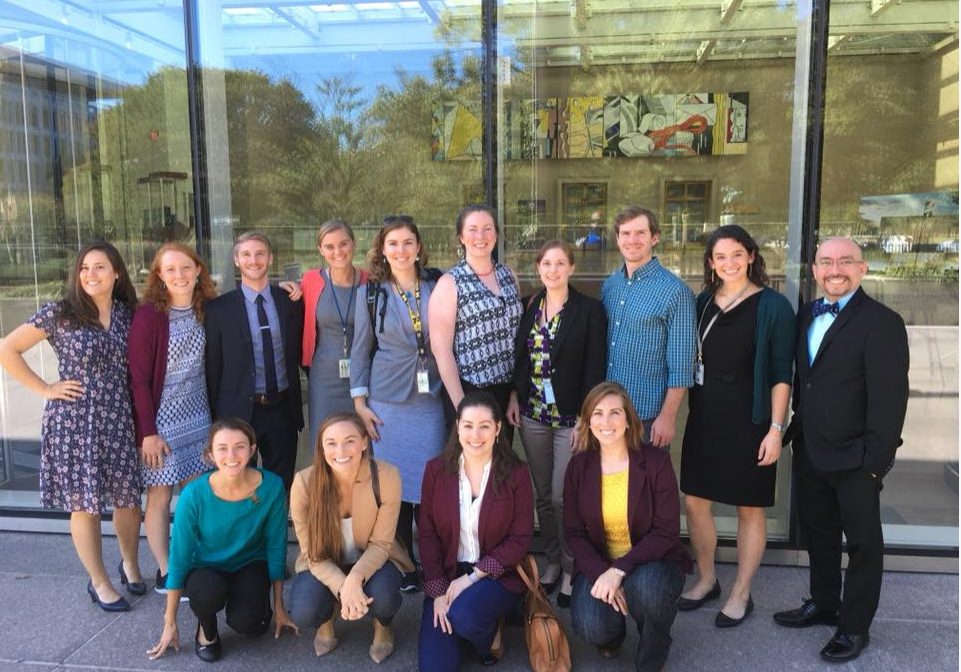Ellie Bors: A Year as a Sea Grant Knauss Fellow

June 2018 -- A year in D.C. as a Sea Grant Knauss Fellow can be a life-changing experience.
The Sea Grant Knauss Fellowship is a prestigious educational and professional experience for graduate students with an interest in ocean, coastal and Great Lakes resources and in the national policy decisions affecting those resources. The Fellowship, named after one of Sea Grant's founders, former NOAA Administrator, John A. Knauss, matches highly qualified graduate students with "hosts" in the legislative and executive branch of government located in the Washington, D.C. area, for a one year paid fellowship.
A Woods Hole Sea Grant nominee and graduate of the MIT-WHOI Joint Program, Dr. Ellie Bors was placed as a 2017 Knauss Fellow with the NOAA Office of International Affairs (OIA), a staff office that provides strategic direction, advice, and coordination for NOAA’s international engagement and ensures that engagement is consistent with U.S. foreign policy.
Bors’s work at OIA spanned diverse topics. She served as the main point of contact for NOAA’s scientific engagement with Cuba, briefed NOAA’s leadership for high-level international conferences, and advised on invasive marine species policy in the Arctic, which drew on her scientific background studying the genetics of invading species. In her capacity as a Fellow, Bors participated in the working group of the Protection of the Arctic Marine Environment (PAME) of the Arctic Council. The Arctic Council is the leading intergovernmental forum promoting cooperation, coordination and interaction among the eight countries with jurisdiction in the Arctic, Arctic indigenous communities and other Arctic inhabitants on common Arctic issues, in particular on issues of sustainable development and environmental protection. The PAME working group addresses policy and non-emergency pollution prevention and control measures related to the protection of the Arctic marine environment from both land and sea-based activities.
“It was an incredible year,” says Bors. As a Fellow, Bors immersed herself in the complex issues NOAA is involved in and developed an aptitude for strategic political thinking, speaking to diverse people from many different backgrounds, writing in a policy context, and sometimes navigating difficult diplomatic interactions.
In the course of her work, Bors says she developed a great network of colleagues in the domestic and international policy realm, and discovered a lot about what’s important to her in her career. She also participated in a number of enriching professional development opportunities, which are an integral part of the Knauss Fellowhsip. They ranged from giving a presentation on invasive species and conservation at an academic meeting in Colombia to attending networking meetings in DC, to traveling to Finland for an Arctic Council Working Group meeting, to attending a two-day workshop in London and giving an invited talk at the University of Exeter.
But, says Bors, one of the most memorable professional development activities of her fellowship was participation in Bering Sea Days, a week-long event held on St. Paul Island in the Pribilof Islands, 300 miles west of the Alaska mainland. The Pribilof Islands are a cluster of islands that sit in the middle of the Bering Sea, not far from the break of the continental shelf. Each year, scientists and educators from multiple government agencies travel to St. Paul and interact with the 60 or so pre-K – 12 students on St. Paul to provide novel learning experiences and career options in the sciences and more.

Ellie Bors, far right, led St. Paul's students in a mock-Arctic Council meeting during Bering Sea Days.
Bors spent her week there teaching the middle and high school students on St. Paul Island about how governments work together to develop strategy and action plans to tackle environmental problems. She developed a lesson plan to have the students simulate an Arctic Council meeting, with groups of students representing the positions of various member states in the Council. Bors wrote about the event in an article for NOAA.gov.
“It was an enriching experience,” says Bors. “I was able to glimpse life in the sub-Arctic in small indigenous communities. And I was able to apply knowledge from my fellowship year, meet extraordinary educators and scientists, and spend time on the stunning island of St. Paul. I am extremely thankful for my Knauss year.”
Bors is currently a Postdoctoral Scholar in the Marine Mammal Institute at Oregon State University's Hatfield Marine Science Center. She works with Dr. Scott Baker to develop molecular methods to determine the age of endangered Cook Inlet beluga whales. She was also named one of 16 Fulbright Arctic Initiative Scholars for 2018-2019 and is studying distributional shifts in Arctic fish species.
